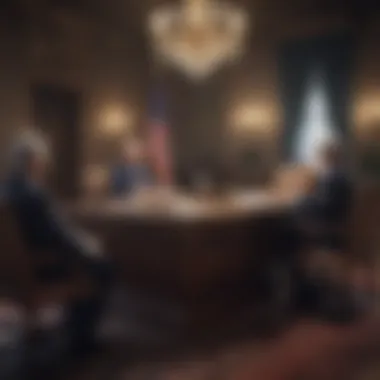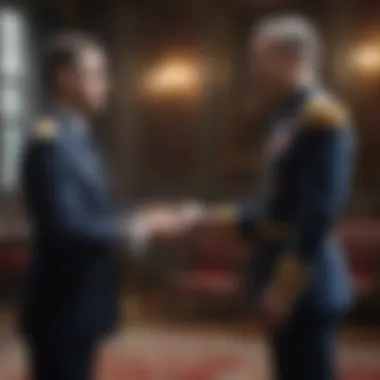Unveiling the Ambassador: A Comprehensive Exploration of Diplomatic Envoys


Overview
Ambassadors play a crucial role in international relations, acting as key representatives of their countries on a global scale. This section will delve into the significance of ambassadors and their impact in diplomatic affairs, providing a detailed analysis of their responsibilities, selection process, and contributions to global diplomacy.
Selection Process
The selection process of ambassadors is a meticulous task that involves various considerations. From diplomatic experience to cultural understanding and language proficiency, the criteria for appointing ambassadors are intricate and strategic. This section will explore the intricate process of selecting ambassadors and the factors that influence these crucial decisions.
Responsibilities
Ambassadors bear significant responsibilities in representing their nations abroad. From negotiating treaties to promoting cultural exchange and protecting the interests of their countries' citizens, the duties of an ambassador are diverse and demanding. This section will provide a comprehensive overview of the varied responsibilities that ambassadors undertake in their diplomatic roles.
Impact on Global Diplomacy
The impact of ambassadors on global diplomacy is profound, shaping international relations and influencing policy decisions. By fostering communication between nations, resolving conflicts, and building cooperative partnerships, ambassadors play a vital role in promoting peace and cooperation on the world stage. This section will examine the far-reaching impact that ambassadors have on shaping the course of international relations.
Final Verdict
Introduction:
Ambassadors play a pivotal role in shaping international relations, serving as the linchpins between nations. In this comprehensive guide to diplomatic representatives, we delve into the multifaceted world of ambassadors. From their critical responsibilities to the intricacies of the selection process, this article illuminates the significance of these emissaries in global diplomacy.
Defining an Ambassador:
Origin and Etymology:
The term "ambassador" stems from the Latin word "ambactus," meaning servant or envoy. This etymology underscores the ambassador's role as a representative serving their country's interests abroad. The historical roots of the ambassadorial position trace back to ancient civilizations, where emissaries were dispatched to forge alliances and negotiate treaties. Understanding the origin of the term provides insights into the evolution of diplomatic missions and the enduring importance of ambassadors in modern diplomacy.
Historical Evolution:
The historical evolution of ambassadors reflects the dynamic shifts in international relations over centuries. From medieval envoys bearing royal seals to today's sophisticated diplomatic corps, the role of ambassadors has evolved significantly. The establishment of embassies and the codification of diplomatic protocols have streamlined communication between states. However, evolving technologies have also transformed the nature of diplomatic engagement, presenting new challenges and opportunities for ambassadors on the global stage.
Importance of Ambassadors:
Key Players in Diplomacy:
Ambassadors serve as key players in advancing diplomatic initiatives and fostering international cooperation. Their strategic interventions can defuse conflicts, build trust between nations, and address global challenges collectively. By cultivating personal relationships with host officials and diplomats, ambassadors amplify diplomatic efforts and contribute to the resolution of complex issues.
Promoting International Relations:
Ambassadors play a pivotal role in promoting international relations by fostering cultural exchanges, hosting diplomatic events, and facilitating mutual understanding. Through public diplomacy efforts, they showcase their nation's values, traditions, and contributions to the global community. By engaging with local communities and thought leaders, ambassadors enhance cross-cultural dialogues and strengthen bilateral ties.
Objectives of the Article:
Exploring Ambassadorial Roles:
This article aims to explore the multifaceted roles of ambassadors, shedding light on their diverse responsibilities and diplomatic functions. From representing national interests to engaging in crisis management, ambassadors navigate complex geopolitical landscapes with finesse and tact. By dissecting the intricacies of ambassadorial roles, readers gain a nuanced understanding of the demanding yet rewarding nature of diplomatic service.
Understanding Diplomatic Representations:
Delving into the realm of diplomatic representations, this article elucidates the nuances of establishing and maintaining diplomatic ties between nations. Through formal credentialing ceremonies and diplomatic courtesies, ambassadors pave the way for constructive dialogues and cooperation. By deciphering the protocols and protocols governing diplomatic interactions, readers glean insights into the conventions that underpin international diplomacy.


Ambassadorial Duties
Ambassadorial duties hold a pivotal role in the realm of diplomatic representation. These duties encompass a myriad of responsibilities that aim to advocate for national interests, foster cultural exchange, and ensure security and intelligence functions. The significance of these duties cannot be understated, as they form the backbone of a country's external relations and play a crucial role in shaping international alliances and interactions.
Advocating National Interests
Ambassadors play a crucial role in advocating for their respective country's national interests on the global stage. One essential aspect of this duty is negotiating treaties. Negotiating treaties involves intricate diplomatic discussions aimed at securing beneficial agreements for the ambassador's homeland. This requires adept negotiation skills and a deep understanding of international relations. Additionally, facilitating trade agreements is another key duty that ambassadors undertake. By promoting trade relations and removing trade barriers, ambassadors contribute to economic growth and foster international cooperation.
Negotiating Treaties
Negotiating treaties is a complex process that demands astute diplomatic skills and a keen awareness of geopolitical nuances. Ambassadors engage in negotiations to ensure that treaties serve their country's best interests while also fostering amicable relations with other nations. The ability to strike beneficial treaty agreements can significantly enhance a country's standing in the global arena.
Pros:
- Enhances diplomatic relationships
- Opens avenues for collaboration
Cons:
- Requires meticulous attention to detail
- Potential for prolonged negotiation processes
Facilitating Trade Agreements
Ambassadors involved in facilitating trade agreements work towards strengthening economic ties between nations. By ironing out trade regulations and fostering a conducive business environment, they promote mutually beneficial trade practices. This serves to boost commerce, create job opportunities, and enhance economic prosperity.
Pros:
- Stimulates economic growth
- Encourages international trade partnerships
Cons:
- Navigating complex trade policies
- Ensuring fair trade practices
Cultural Exchange Initiatives
Cultural diplomacy forms an integral part of an ambassador's duties. Promoting cultural diplomacy involves showcasing a country's rich heritage, traditions, and art forms to foster mutual understanding and respect between nations. Moreover, ambassadors engage in initiatives that highlight their homeland's cultural contributions on the global stage.
Promoting Cultural Diplomacy
Promoting cultural diplomacy requires ambassadors to leverage cultural assets to bridge gaps and cultivate stronger ties between nations. By organizing cultural events, art exhibitions, and exchange programs, ambassadors facilitate cultural exchanges that promote dialogue and appreciation of diverse cultures.
Pros:
- Enhances cultural relations
- Cultivates cross-cultural understanding
Cons:
- Demands creative cultural initiatives
- Requires sensitivity to cultural differences
Showcasing National Heritage
Showcasing national heritage involves presenting a country's unique traditions, history, and values to an international audience. Ambassadors strive to showcase their homeland's heritage through various mediums such as cultural performances, exhibitions, and heritage tours. This helps in creating a positive image of the country abroad.


Pros:
- Highlights national identity
- Generates cultural interest
Cons:
- Balancing tradition with modernity
- Maintaining cultural authenticity
Security and Intelligence Functions
Aside from cultural and economic roles, ambassadors also play a crucial part in ensuring the security and intelligence interests of their country. Monitoring political developments is a key aspect of this duty, wherein ambassadors keep a close watch on political dynamics in the host country and region to provide timely insights to their government. Engaging in crisis management is another vital function, where ambassadors must navigate challenging situations and mitigate risks to safeguard national interests.
Monitoring Political Developments
Monitoring political developments involves staying abreast of local and regional political events that may impact the ambassador's country. Ambassadors analyze political trends, anticipate potential risks, and provide valuable intelligence to their government for informed decision-making. This function is critical in maintaining national security and shaping foreign policy responses.
Pros:
- Enhances threat assessment capabilities
- Strengthens diplomatic engagement
Cons:
- Demands continuous monitoring
- Requires nuanced political analysis
Engaging in Crisis Management
In times of crises, ambassadors are tasked with managing challenging situations to protect their country's interests and citizens. Responding swiftly and effectively to crises such as natural disasters, political upheavals, or security threats is essential for maintaining stability and security. Ambassadors play a central role in coordinating efforts with local authorities and international partners to address crises.
Pros:
- Demonstrates crisis leadership
- Strengthens diplomatic ties through collaboration
Cons:
- High-pressure situations
- Balancing national security with diplomatic protocols
Selection Process
In the realm of diplomatic representations, the selection process of ambassadors stands as a pivotal stage. This process plays a crucial role in determining the individuals who will represent a nation on the global stage. Throughout history, the meticulous selection of ambassadors has been a strategic maneuver in shaping international relations. Factors such as political acumen, negotiation skills, and language proficiency are carefully assessed to ensure that the appointed ambassador can effectively advocate for their country's interests. The selection process ensures that only the most qualified and capable individuals are entrusted with the significant responsibility of serving as diplomatic representatives.
Criteria for Appointment
Political Acumen
Political acumen is a fundamental aspect considered during the selection of ambassadors. The ability to navigate complex political landscapes, understand geopolitical dynamics, and strategize diplomatic actions is paramount. Ambassadors with strong political acumen can effectively represent their countries' interests, build alliances, and advance diplomatic negotiations. This keen insight into political affairs enables ambassadors to maneuver through intricate diplomatic scenarios with finesse and tact, contributing significantly to their success in fostering international relations.
Negotiation Skills
Negotiation skills are indispensable for ambassadors in achieving diplomatic objectives. Adept negotiators can broker deals, resolve conflicts, and secure agreements beneficial to their nations. Ambassadors proficient in negotiation possess the art of compromise, the power of persuasion, and the ability to find mutually agreeable solutions. These skills are vital in navigating the complexities of diplomatic discourse, where forging consensus and fostering cooperation are paramount.
Language Proficiency


Language proficiency plays a critical role in ambassadorial duties. Ambassadors who are fluent in multiple languages can effectively communicate with their foreign counterparts, engage in nuanced discussions, and bridge linguistic divides. Proficiency in foreign languages enhances cultural understanding, facilitates productive dialogues, and strengthens international ties. Ambassadors with strong language skills exhibit respect for diverse cultures and demonstrate a commitment to effective communication in the realm of diplomacy.
Training and Preparation
Diplomatic Training Programs
Diplomatic training programs equip ambassadors with the necessary knowledge and skills to navigate the complex world of international relations. These programs offer insights into diplomacy, protocol, negotiation strategies, and crisis management. Ambassadors undergo rigorous training to hone their diplomatic acumen, enhance their cultural intelligence, and prepare for the challenges of representing their nations abroad.
Country-Specific Orientation
Country-specific orientation familiarizes ambassadors with the customs, traditions, and political landscapes of the countries they will represent. Understanding the intricate nuances of a nation's culture and society enables ambassadors to foster meaningful connections, avoid cultural faux pas, and navigate diplomatic intricacies adeptly. Country-specific orientation empowers ambassadors to adapt swiftly to new environments, engage effectively with local stakeholders, and promote mutual understanding between nations.
Credential Presentation
Formal Credentialing Ceremony
The formal credentialing ceremony marks the official commencement of an ambassador's role in a foreign country. During this ceremony, ambassadors present their credentials to the host country's head of state, signaling the commencement of diplomatic relations. The formality and solemnity of this ceremony underscore the significance of the ambassador's appointment and signify the establishment of diplomatic ties between nations.
Submission of Letters of Credence
The submission of letters of credence formalizes an ambassador's position and credentials to the receiving state. These letters, issued by the ambassador's head of state, serve as official documentation of the ambassador's authority to represent their country abroad. Submission of letters of credence initiates the ambassador's engagement with the host country's government and paves the way for meaningful diplomatic dialogue and cooperation. This formal gesture signifies the commencement of the ambassador's mission and underscores the diplomatic protocols observed in international relations.
Challenges Faced
In the realm of diplomatic representation, the challenges faced are of paramount significance, requiring astute navigation and strategic planning. One critical aspect that demands attention is the interpretation and language barriers that often impede effective communication and understanding between nations. Overcoming linguistic challenges stands as a substantial hurdle in fostering meaningful dialogues and agreements. Diplomats must possess not only linguistic prowess but also cultural sensitivity to bridge these divides successfully. Navigating cultural differences presents another layer of complexity in diplomatic relations. Understanding societal norms, traditions, and values is essential to avoid misunderstandings and conflicts in intercultural exchanges. Hence, diplomats face the intricate task of harmonizing diverse cultural perspectives to cultivate fruitful international collaborations.
Overcoming Linguistic Challenges
The process of overcoming linguistic challenges is pivotal in diplomatic initiatives, as effective communication is the cornerstone of fruitful diplomatic relations. Ambassadors equipped with multilingual proficiency possess a competitive edge in negotiations and mediations, fostering smoother interactions and mitigating potential misunderstandings. The ability to transcend language barriers enables diplomats to convey nuanced ideas accurately, bridging gaps in understanding and promoting harmonious international engagement. However, relying solely on language proficiency may not suffice, as cultural context and non-verbal communication also play significant roles in effective cross-cultural communication.
Navigating Cultural Differences
Navigating cultural differences requires diplomats to exhibit sensitivity and adaptability to diverse cultural contexts. By fostering cultural intelligence, diplomats can navigate unfamiliar customs and traditions with respect and tact, fostering mutual respect and understanding. Acknowledging and embracing cultural diversity not only enhances diplomatic interactions but also paves the way for innovative solutions and collaborations. Successful navigation of cultural nuances enriches diplomatic relationships, fostering trust and cooperation among nations.
Political Sensitivities
Political sensitivities in diplomacy underscore the importance of maintaining neutrality and impartiality in international relations to uphold credibility and trust. By treading carefully on politically delicate matters, diplomats can avert potential conflicts and diplomatic crises, preserving peace and stability. Maintaining neutrality allows diplomats to facilitate dialogues and negotiations without bias, promoting fair and equitable resolution of disputes. However, maintaining neutrality does not equate to passivity; diplomats must skillfully navigate political landscapes while upholding ethical standards and diplomatic integrity.
Maintaining Neutrality
Maintaining neutrality is a cornerstone of diplomatic professionalism, fostering trust and credibility in relationships with various stakeholders. By abstaining from partisan inclinations, diplomats can effectively mediate disputes and brokering agreements, relying on impartiality to preserve diplomatic integrity. The art of maintaining neutrality lies in striking a balance between advocating for national interests and respecting the sovereignty and autonomy of other nations, navigating complex political terrains with finesse and prudence.
Addressing Diplomatic Incidents
Addressing diplomatic incidents necessitates swift and tactful responses to mitigate tensions and prevent escalation. Diplomats must employ deft diplomatic maneuvers to address crises and conflicts diplomatically, restoring damaged relationships and fostering reconciliation. Effective crisis management demands a strategic approach that considers the interests of all parties involved while upholding international norms and conventions. By addressing diplomatic incidents with diplomacy and strategic acumen, diplomats can safeguard national interests while promoting peace and cooperation globally.
Security Concerns
Security concerns loom large in the realm of diplomatic representation, underscoring the imperative of ensuring personal safety and protecting national interests in hostile environments. Diplomats face multifaceted security challenges, ranging from physical threats to cybersecurity risks, necessitating proactive measures to safeguard confidential information and ensure the well-being of diplomatic personnel. In dealing with hostile environments, diplomats must exhibit resilience and resourcefulness, navigating precarious situations with composure and vigilance to uphold diplomatic missions successfully.
Ensuring Personal Safety
Ensuring personal safety is a top priority for diplomats, who operate in diverse and sometimes hazardous environments with heightened security risks. By implementing stringent security protocols and risk assessment measures, diplomats can mitigate potential threats and safeguard their well-being effectively. Diplomatic missions often collaborate with local authorities and security agencies to enhance security measures and ensure the safe conduct of official duties, enabling diplomats to focus on their mandates without compromising personal safety.
Dealing with Hostile Environments
Dealing with hostile environments requires diplomats to exhibit adaptability and strategic acumen in navigating challenging political landscapes and security threats. By proactively assessing risks and implementing contingency plans, diplomats can effectively address security concerns and maintain operational effectiveness in hostile territories. Tactful engagement with local stakeholders and adherence to security protocols are essential in mitigating risks and safeguarding diplomatic personnel, ensuring the continuity of diplomatic functions and the protection of national interests.



